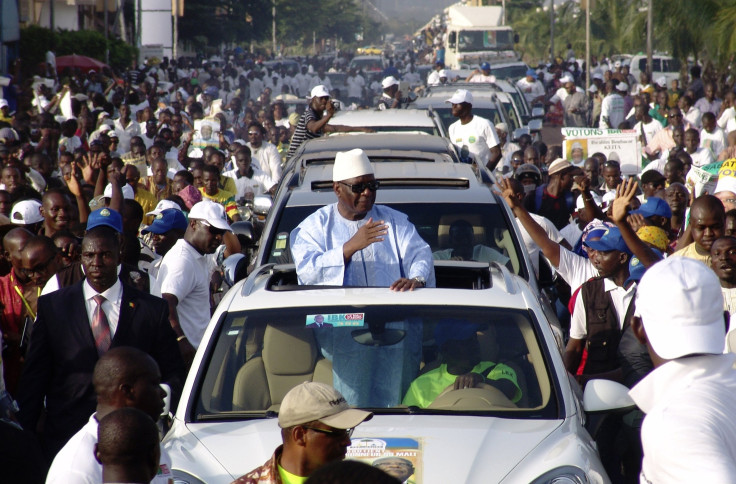Ibrahim Boubacar Keita Wins Mali Presidential Election, Promises To Forge Unity

Ibrahim Boubacar Keita emerged as the winner of Mali's presidential election Monday when his closest contender, former finance minister Soumaila Cisse, conceded defeat.
Keita, 68, served as prime minister from 1994 until 2000 and is widely known as IBK. He had a significant lead over 26 other candidates when the first round of elections was held two weeks ago, though it wasn't enough to prevent a run-off against Cisse on Aug. 11.
As the second-round results rolled in, it became clear that Keita maintained his advantage. International and domestic observers have called the vote largely free and fair. Following early statements contesting the validity of the results, Cisse bowed out Monday and sent a warm message to his new president via Twitter.
"My family and I went to congratulate Mr Keita, the future president of Mali, on his victory. May God bless Mali," Cisse tweeted.
Ma famille & moi-même sommes partis chez M. Keita, futur président du Mali, le féliciter pour sa victoire. Que Dieu bénisse le #Mali
- Soumaila CISSE (@Soumailacisse) August 12, 2013
The message bodes well for Mali, which has suffered political and social turmoil since early 2012, when separatists of the ethnic Tuareg group, followed by Islamist militants with links to al-Qaida, took over the country's vast and sparsely populated northern region. That in turn prompted a March 2012 military coup in the capital city of Bamako, ending two decades of fairly stable democracy.
The insurgency stirred up ethnic tensions in Mali, displaced hundreds of thousands and eventually incurred a response from the French military, which swooped into the country this January to oust the militants from northern strongholds including Gao, Kidal and Timbuktu.
Now Keita, a bold politician and avowed secularist whose diverse supporters include coup backers, Bamako officials and Islamist leaders, will be tasked with piecing the country together again. Militant separatist Tuaregs up north, who have agreed to a ceasefire, will be expecting peace talks soon. They and other Tuaregs in the country have long complained that Bamako has failed to allocate resources to their communities. But the darker-skinned Malians who are most concentrated in the south still harbor resentment toward their northern compatriots, and bridging that gap will be one of Keita's biggest challenges.
Also at hand will be the disbursal of the more than $4 billion in aid promised by international donors, which was pending a successful election. Spurring broad-based growth and development in a country plagued by poverty and food insecurity will be a monumental task. Keita has plenty of political experience and has spent time working for development projects such as the European Development Fund, but some still have concerns about an authoritarian streak due to the bold, uncompromising style of governance he practiced as prime minister.
Time will tell whether Keita has the patience and political savvy to get Mali back on track following months of upheaval. The new president, for one, thinks he's up to the task.
"For Mali's honor, I will bring peace and security," said Keita during the campaign, according to Agence France-Presse. "I will revive dialogue between all the sons of our nation and I will gather our people around the values that have built our history: dignity, integrity, courage and hard work."
© Copyright IBTimes 2024. All rights reserved.





















